A Visit to the Wall Street Duane Reade
by Myles Tanzer
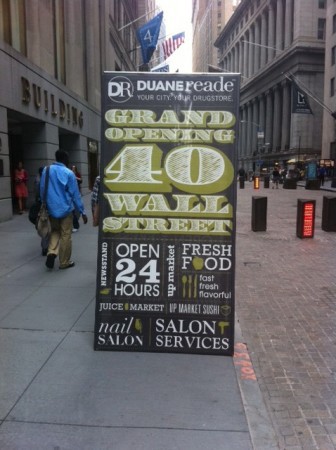
At yesterday’s opening of Duane Reade’s new store at 40 Wall Street, three men in suits sat under a rolling stock ticker and had what seemed to be the first ever power lunch held in a drug store. I gravitated towards the someone who I thought was the manager of the store: I wanted to understand why this Duane Reade was so lush.
She sent me to talk to one of the power lunchers, Joe Magnacca, the — wait for it — President for Daily Living Products & Solutions at Walgreens Duane Reade Inc. With a little soulpatch and nice pinstripe suit, he is clearly the most baller Walgreens exec.
The old Duane Reade top-earner was in the World Trade Center and Duane Reade has been looking for a comparable new worthy space since that one… closed. He told me that the 22,000-square-foot space had been vacant for 15 years. The developers were able to keep most of the original flooring intact — something they were “proud of.”
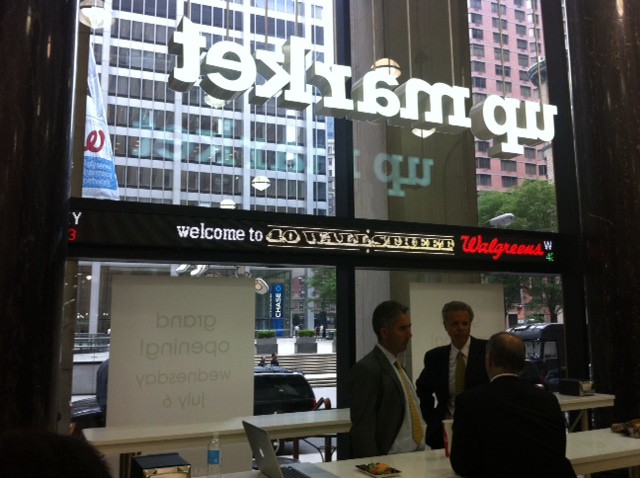
And this Duane Reade employs a fascinating “money” font! All told, the opening went smoothly, although on day two, we are informed that an escalator broke down. (Scandal!)
40 Wall Street — completed in 1930 — is the former Bank of Manhattan Trust building and is now known as a Trump Building. Trump is, not surprisingly, a huge cheerleader of his (his? You never know!) new tenant and he has good reason to be — this thing is totally in the Trump mindset. It’s not so much a larger Duane Reade as it is a mini-Walmart.
Besides having no fewer items than your average supermarket has, the Duane Reade features a juice bar and a walk-in health clinic.

The sushi counter is staffed by three real live apparently Japanese people™ and there was even an extra, older Real Japanese guy giving them orders and barking commands. The sushi sells for seven dollars a roll and seemed… fine.
But perhaps this is an actual eating destination? Elsewhere, a woman told everyone around her that this Duane Reade had the best egg salad she’s ever had in her life.
The incredibly expansive beauty section houses a small nail salon (manicures for $10!). There’s also a station to get your hair blown out. Magnacca called this a “blow bar.” That was uncomfortable.
A scruffy young dude was seen soliciting skin care advice from the cutest beauty section lady salesperson. His misery was blatant when she grabbed a cream off of the shelf and said “my boyfriend uses this one!” It’s still your same old Duane Reade in those ways, even if there’s touch-screen Coke machines that dispense drinks like Peach Sprite and Vanilla Coke. I mean, it’s just a store.

Going Home With Pulp
Going Home With Pulp
by Marlow Riley

Last Sunday, the third day of the Wireless festival in Hyde Park, I wandered through a crowd of around 50,000 people, past a crowded Fish & Chips stand, and a much less crowded “BBQ Burger” stand, past red-faced men swearing and carrying four pints of beer, and groups of healthy-looking European student-types sitting on blankets, to wait for a group of seven people from Sheffield to play their first show in London since 2002.
Both of these cities had loomed so large in my imagination for so long; London was, of course, London, but Sheffield was “Sheffield: Sex City,” as ludicrous as that may sound on its face. I was about to — finally — watch the band that made it that way: Pulp. So after the curtain fell and I joined the mass in singing, “You say you want to go home…” it was a surprisingly emotional moment. There were (possibly) drops of tears in the corners of my eyes and from the looks of it, a lot of others as well. It was mass euphoria, and if Jarvis Cocker wanted to start a revolution right then and there, we would have been his army.
***
I was an obsessive music fan from the beginning. I used to save up my allowance to buy children’s 45s and tapes, moved on to the Beatles, and eventually graduated to KROQ and the blue Trouser Press record guide, which is still the reason why I know who Blue Rondo a la Turk is. I had heard the Smiths and the Cure and the Ramones on the radio, but in this book were fascinating-sounding bands I’d never come across before, like the Fall and the Cramps. Three-quarters of the pages in that book were soon dog-eared, and the binding fell apart fast.
Growing up in a college town meant a record store with a good selection was nearby, vinyl was cheap, and a copy of Second Edition would only set you back a few dollars. Soon, Select and Melody Maker and NME found their way into my hands, opening up another world of bands called things like S*M*A*S*H and These Animal Men, who were playing something called the New Wave of New Wave. I never heard any of them until much later, but I dutifully bought my Ride albums and My Bloody Valentines and the first Blur record.

And then Britpop happened. Brett Anderson from Suede posed in front of a Union Jack on the cover of Select, which was taped to my wall by the end of the day. Suede, Elastica and Blur were offering me something I wasn’t getting from the US punk and indie bands I loved. They were stylish, they were cool, and they knew how to dress. Much as I loved Pavement and Jawbreaker and Dinosaur Jr., they wore t-shirts. Bands like Antioch Arrow and Swing Kids and the white-belts-and-Spock-hairdo crowd put a little more thought into it, and others had the manifestos and the uniforms, but it was all too serious. It looked like the UK was having all the fun. It seemed cosmopolitan, and even the Little Englandisms of dog tracks and the dole held a romantic allure to someone living 6,000 miles away.
At the head of the table sat Pulp, as far as I was concerned. Pulp offered a hero in Jarvis Cocker, who was witty and glamorous and free of the silliness of the other frontmen. He didn’t pose at bisexuality like Brett Anderson (“I see myself as a bisexual man who’s never had a homosexual experience”); he didn’t play dumb like Damon Albarn (“I started off reading Nabokov and now I’m into football, dog-racing, and Essex girls”); and he wasn’t a clown like the Gallaghers (all of it, really). He was too tall, too gangly, his fingers too long, to be a sex symbol. But he was. He was also too old (he was in his 30s before he had anything remotely like a hit). He was the smart outcast who showed that if you stick around for long enough, eventually everyone else would get it. In short, he was the perfect idol for a teenager who thought he was clever and different, but was, in reality, sort of annoying and obnoxious and probably shouldn’t have been smoking those colored cigarettes.
***
It felt like London was spending the entire weekend celebrating Pulp. (It wasn’t. The official subway announcements about the weekend’s big concert were the Take That shows at Wembley Stadium. Robbie Williams is back in the band, you know. English people find that, and him, relevant.) The obscure, so therefore cool, indie-pop/soul club How Does it Feel to be Loved? — the kind of place where Stuart Murdoch and Lawrence from Felt guest DJ — hosted an “Alternative Pulp Top Ten” night in a shabby back room of a pub, full of faded, seedy glamour and disco balls. Feeling Gloomy, a club night of “sad dance songs,” has their official Pulp celebration this coming weekend, but on Saturday, most of the crowd dancing to the Smiths and St. Etienne were already talking about the band and the next day’s concert. I was enchanted. Being in a room, dancing to these songs was like stepping back into 1995. It was wonderful. It was what I always imagined happened in England, although I know it probably never really did. It was more like what happened in Los Angeles, back in the ’90s, a quick drive down the 10 freeway from where I grew up.
A rarely remarked upon aspect of Los Angeles is the heavy Anglophilic strain that runs through it. From when the Byrds added the Y, to Rodney Bigenheimer and his English Disco, to the Paisley Underground of the early ’80s, people in the city have looked to England. This was where Depeche Mode and the Cure had their biggest fanbases, and where Morrissey fled to when he was banished from his home country. Even the Sunset Strip glam bands were warmed-over Sweet. This was where the Mod revival never died and where 2-Tone became third-wave ska (sorry about that one). This was where the US home of the Britpop scene was in the mid-to-late ’90s, centered on a club called Café Bleu (named after a Style Council song, for Christ’s sake). Bands like Kenickie played there (so did the Bluetones and Sleeper and others, but Kenickie was and is the important one and everybody knows that), and where we danced to Pulp and Ride and Supergrass, and the Mods danced to Motown and Stax. It was a fantasy, and a fetishization of generations of pop culture that didn’t have a lot of overlap in the first place. It was a little better than eating scones and talking about the Queen, but it wasn’t really all that different.
When I was 18, someone who had recently come back from England told me that his friend there (who was, apparently, the singer from theatrical post-Britpop band David Devant and his Spirit Wife, though this has never been confirmed) talked about how everyone in the UK hated American Britpop kids. Whether true or not, he was probably right because, well, everybody hates a tourist, but to those of us who cared, what they were doing over there was the most important thing in the world. They were a way to get out of ourselves, to be, in a minor way, a little less America-centric, and, most importantly to a teenager, to pick a side a side that was ours, since the rest of the country didn’t care. Our side was clever and energetic. Our side had Jarvis Cocker. Yours didn’t. You still need to believe in these things when you’re 17, because it should mean everything.
***
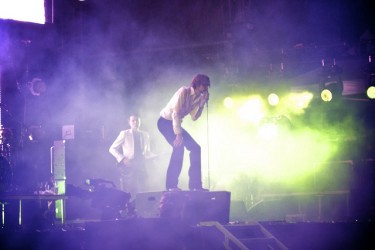
It was still light out. Grace Jones and her final costume change had left the stage and a large black curtain was raised. Anticipation built, and people began gently pushing forward, carrying around pints in paper cups, and apologizing constantly, like rom-com understudies for Hugh Grant. But this was metaphorical floppy hair tossing, mostly; heads have gotten shinier, and the hairlines of Pulp fans have been receding for the past ten years.
Phrases written in laser began to appear on the curtain, which either mocked rock cliché (“Make some noise! …I can’t hear you…Exciting stuff”), called back to the band’s hits (“Do you remember the first time? …Well, do you?”) or were non-sequiturs (“Do you want to see a dolphin?”). After a few synth stabs, a robotic voice read the words from the Different Class liner notes: “Please understand. We don’t want no trouble. We just want the right to be different. That’s all.”
While the four neon letters of P-U-L-P began to appear one-by-one, the band played the intro to “Do You Remember the First Time?” The curtain was pulled down, the crowd’s singing almost overwhelmed the sound of the PA, and Jarvis, bearded and wearing the glasses he once shunned, danced like nothing had changed. The rest of the band, looking these days more like art teachers than art students, sounded perfect. They weren’t going through the motions, and this wasn’t just for a payday, like the last few years of Pixies shows have been. They were enjoying it.
The set was very Different Class-heavy (as it should be, few bands have made an album as good), and only one non-album song was played (“Mile End,” because it was a London show). They played the hits, and when the hits are this good, there’s very little to complain about; I did, a little, but I had to, on principle. Every kick was cheered; every chorus was shouted to the back of the field. Between the songs, there were small reminders, like discussing how important the student protests are because the band wouldn’t exist without them, of how Pulp have always been a band that has subtly, or not so subtly, exposed class boundaries and urged revenge on those.
Finally, around an hour and half later, “Common People.” With some righteous anger shaking his voice, Jarvis pointed out how on one side of the festival was Hyde Park Speaker’s Corner, a free speech area that Marx, Orwell, and Marcus Garvey once used for public debate, and One Hyde Park on the other, a building “you need to be a billionaire” to live in. “So fuck ‘em.” While it still seems strange that a song this angry, this vicious, a song that spares no one, neither the posh girl nor the working class lad, nor for that matter the narrator or the listener, could have ever become a huge hit (the greatest #2 song in pop history) or a defining song of a generation, it did. It still bites, and it’s still rapturous. While the billionaires might still be our enemy, at that moment, everyone else was on the right side.
Marlow Riley is a writer and low-level media employee living in Brooklyn. On the rare occasions he can remember his password, he is on Twitter.
Photos of Pulp by aurélien. from Flickr.
"Brooklyn's first and only New England-style clam shack"... on Kickstarter!
Hmm, is this the future? The Littleneck, a clam shack to exist between Carroll Gardens and Park Slope, is fundraising on Kickstarter. Can you… do that? I mean, you can! Sure! The best part: “we promise not to get our seafood out of the Gowanus Canal.” NOT SO LOCAL NOW, ARE YOU!
How Republicans and Tea Partiers Alike Used the Heritage Foundation's #AskObama Script
by Abe Sauer
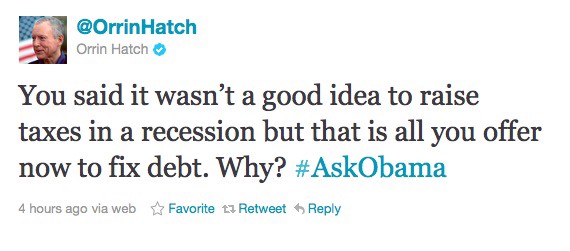
Yesterday, President Obama held a live chat session on Twitter. Billed as a “townhall,” the President spent an hour fielding questions from Twitter users about the state of the nation. It was a magnificent stunt in which the greatest beneficiaries were Twitter itself and amateur comedians.
That doesn’t mean nobody took it seriously. A day before the event, The Heritage Foundation, a tax exempt, 501c(3) nonpartisan “educational institution” whose goal is “to formulate and promote conservative public policies,” published five Twitter questions to “put President Obama on the spot.”
These five questions, gift-wrapped by Ericka Anderson, Heritage Foundation’s senior digital communications associate and former communications director for Congressman Todd Rokita, were fascinating. And boy, did they get asked.
Your budget was rejected by Senate 97–0 & Dems haven’t produced budget in 700+ days. Where is your economic plan? #AskObama
You said your stimulus plan would keep unemployment below 8%. Do you agree that was a trillion dollars wasted? #AskObama
You said it wasn’t a good idea to raise taxes in a recession but that is all you offer now to fix debt. Why? #AskObama
You’ve added more costly regulations in 2yrs than any of your predecessors, who all reviewed. When will it stop? #AskObama
Gas prices are high. We’re losing 90m barrels of oil due to your moratorium, plus jobs. Why release 30m from SPR? #AskObama
Heritage implored readers to “follow suit, or tweet these.”
As expected, conservative organizations did just what The Heritage Foundation asked. Americans for Tax Reform and the 60 Plus Association, tweeted the texts verbatim. Don Irvine, chairman of “Accuracy in Media,” tweeted not just one or two, but nearly all five of Heritage’s set ups.

Demonstrating just how little difference there is between the two when it comes to thought leadership, tea party organizations such as the Philadelphia Tea Party and mainstream GOP orgs such as Kansas Republican Party and the Arizona Legislative District 20 Republican Party, all tweeted the Heritage tweets as their own.
This influence of Heritage followed through when it came to the elected officials who used the foundation’s pre-written tweets are their own.
An establishment Republican who once called the Tea Party “disruptive,” Texas Rep. Bill Flores, tweeted:
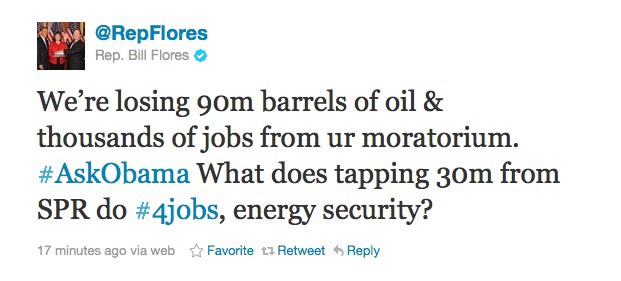
Meanwhile, Tea Party Caucus member and North Carolina Rep. Sue Myrick asked:

Rep. John Shimkus (R-IL):

Rep. Todd Rokita (R-IN):

Rep. Larry Bucshon (R-IN):

Rep. Paul Gosar (R-AZ):
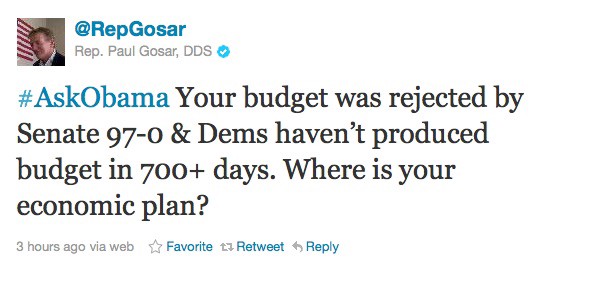
Rep. Patrick McHenry (R-NC):

Jim Pfaff, Chief of Staff for Rep. Tim Huelskamp (R-KS):

And then there was Utah Senator Orrin Hatch:
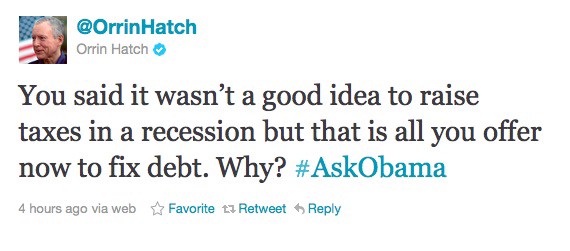
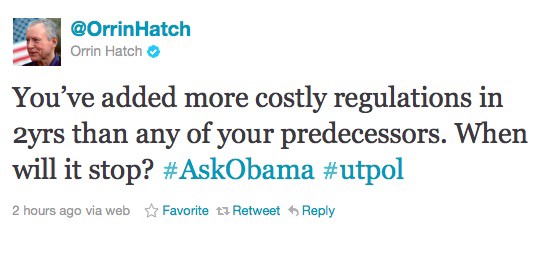
But maybe Hatch doesn’t write his own tweets. Hatch’s director of strategic communications, Jessica Fawson, tweeted from her personal account:
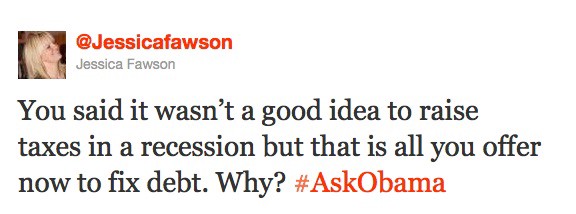
Fawson’s resume lists her as a member of The Heritage Foundation.
Also doing what Heritage directed? Ed Morrissey, senior editor of one of the right’s “leading news and commentary” blog Hot Air. Morrissey tweeted:


Hot Air’s Associate Editor Tina Korbe joined in, not a surprise since she was once an “investigative journalist” for The Heritage Foundation. Before joining Hot Air, Morrissey also worked for the Heritage Foundation’s Policy Blog. (It’s noteworthy that Anderson, the author of the Heritage Twitter directions, used to blog for Town Hall, which acquired Hot Air in 2010.)
The extent to which elected politicians are taking direct talking points from The Heritage Foundation is hardly surprising given the Politico report from just a couple weeks ago that revealed the organization pays millions of dollars a year to the likes of Rush Limbaugh and Sean Hannity. In exchange, in some cases, these conservative captains of ideology read scripts from Heritage as if they were the host’s own words.
Speaking for Senator Hatch, Jessica Fawson was less than eager to answer questions about the tweets a day later. After offering an explanation about how the senator often “retweets” things, Fawson replied to a direct comparison of the Senator’s tweets to the Heritage ones with an official statement: “The American people are asking the same types of questions that Senator Hatch asked of the President. These are the issues that Senator Hatch is focusing on in the United States Senate and as Ranking member of the Senate Finance Committee.”
This seems to imply that Senator Hatch believes The Heritage Foundation is the same as the voice of the American people, a question Fawson chose not to answer. “We already answered your first questions,” she told us.
Abe Sauer can be reached at abesauer at gmail dot com. He’s also on Twitter.
Five Year Old Bigfoot Movie As Important Today As It Was When It Came Out
“Did you know that Focus on the Family, the highly influential, ant-gay, anti-woman multi-million dollar Religious Right group, has a film production department? And did you know they made a Bigfoot movie?”
— It’s like the greatest episode of “7th Heaven” of all time.
In Defense Of Prudes
In Defense Of Prudes

There is little refuge from the explicit for today’s prude. What with the ever-increasing gross-out quotient of TV and movies, and the unending barrage of sordid “news” about the private lives of public figures, nearly everywhere you look you’re seeing something that makes you want to leap right out of your skin. It’s asking for trouble even to admit to being a prude, of course, but if a prude is a person who is like to die of embarrassment about something or other almost all day long, then definitely I am one. And if I were to say further that modesty ought to be reconsidered as the virtue it is, I would be letting myself in for all kinds of grief. Still, though. Modesty ought to be reconsidered as the virtue it is.
If we really value all this open-mindedness and tolerance like we say we do, presumably people just get to be a total square, shy and reserved without fear of censure. They don’t, of course. Maybe they don’t want to see the Apatow movie, maybe the very idea of The Human Centipede sends them shrieking into the next room, maybe they don’t like to go to the strip club. In practice, though, this kind of reluctance is liable to be treated as inferior, defective even, plus politically incorrect because if you say that you don’t like to go to the strip club, this might easily be taken to mean that you’re stuck up and narrow-minded and don’t have respect for sex workers, plus probably you will be told that you’re so inhibited personally that sleeping with you must really be some kind of ordeal. On balance it’s often easier to just go along to the heinous performance art or endure all the farting and whatnot in the Apatow movie than it is to deal with the smackdown if you don’t. Shyness is a personal thing, not a public one, involving just one person’s prefs. for his own surroundings; lots of people just can’t help getting the heebie-jeebies, the creeps and/or the willies from half what goes on.
So, I have come to take back the knife on behalf of us prudes, who quite often are only reserved, shy, terribly square people whose native restraint and weak knees are, in fact, generally accompanied by a deep love of personal freedom and diversity of opinion. Prudery comes in for a lot of flak because people imagine that the prudes want to impose limitations on the behavior of others, but they particularly, especially do not. The wimpy and yikes-prone, far from wishing to restrict or even to express an opinion regarding anyone else’s private practices, are in reality possessed of a fervent, if doomed, desire to know as little about them as possible.
A violent case of the willies is not the same as condemnation, and is in no way irreconcilable with real tolerance; on the contrary. The shock of the prude is generally just an acute form of exasperation; a matter of TMI, that feebly-joking acronym behind which many retreat, yipping and wincing, in an attempt to put on the brakes, because prudes are fond of their privacy, and they’d like everyone else to have their privacy too.
This is where the freedom part comes in, because real freedom means the right to choose for yourself how to go about things. Because there are countless philosophies and belief systems, many of which are in total conflict with one another, modesty and reserve are hugely valuable to promoting that freedom. Modesty encourages us to keep our own policies and practices somewhat under wraps, and also to extend that same level of consideration to others. When everything is forced out into the open to be judged, then there is pressure for all to adhere to some particular way of thinking, “permissive” or otherwise. Where is the freedom, or indeed the permissiveness, in that?
There is also an important distinction to be made between prudery, which is modest, and prurience, which is not. The prurient really do want to ferret out other people’s secrets in order to pass judgment on them, whereas the prudes are running away at top speeds from anything that looks as if it might prove gnarly. There is nothing modest about such moralists as Rick Santorum or Fred Phelps. Theirs is a very old story. In 1698, the playwright and architect John Vanbrugh went after the prurient parson Jeremy Collier in A short vindication of The relapse and the Provok’d Wife from immorality and prophaneness, in words that might easily be applied to quite a number of our own politicians and divines: “[A]n obscene thought must be buried deep indeed, if he don’t smell it out.” Actual prudes detest the prurient most of all, more than anyone else does, for hypocritically dragging everyone through the mud on whatever pseudo-moralistic crusade.
And another thing. For all our vaunted permissiveness, there is an inflexible code of conduct promoted in our current media; we are all bound by very rigid parameters. Ask Anthony Weiner, who committed no crime and yet was forced to resign from office in disgrace for having crossed some invisible line, a line made even more difficult to understand when you consider the kind of stuff that goes on on reality television. And when The Smoking Gun website reported in May that a 25-year-old man was arrested for wanking on an airplane (and no detail of the terrible story was omitted) this indiscretion was in no way seen as an irrepressibly sex-positive act. In a movie, such things might conceivably be greeted with guffaws; IRL, handcuffs and criminal charges.
All of a sudden, successful comedies starring women are featuring nonstop mortification of every kind — not just sexual license but also drunkenness, flatulence and pretty much every kind of ill the flesh is heir to. Stuff that if it were really to happen to anyone you know it would be pretty terrible, and not funny at all. That the centuries-long battle for gender equality and personal freedom has ended in this, the freedom to be depicted pooping in the street (Bridesmaids) or being wasted all day long (Bad Teacher) is not so much empowering as it is bewildering. Some claim that the getting-down-and-dirty is an aid to reshaping old attitudes toward women, that getting them “off the pedestal” is a good thing, and maybe that is so. I don’t know! I can’t help but think there must be a less harrowing way to climb down off of there.
With respect to that weird phrase, “sex-negative,” so often used against the modestly-inclined, whether they are second-wave feminists or merely inclined to go “ew,” I will note only that prudes aren’t so much sex-negative as privacy-positive. If there’s not a “right” way to go about things as deeply personal as sexual practices (and there’s not); if equal license is to be permitted to both the licentious and the restrained, according to their own inclinations (and it should be), then surely it is counterproductive to depict anyone’s particular habits in detail and then single them out for praise or blame.
Modesty serves the vital social purpose of saving everyone from having to judge or be judged; the fear of which judgment has a chilling effect on decisions that, in an ideal world, would be made freely and in private.
So are we prudes really as we are often depicted, all wearing granny underpants and never ever having any of the incredible sex they like to brag about in magazines? Maybe! That is for us to know and you to never, ever find out.
Maria Bustillos is the author of Dorkismo and Act Like A Gentleman, Think Like A Woman.
'News of the World' Shuttered
Uh, wow. In the wake of Britain’s phone hacking scandal, the News of the World will end with Sunday’s edition.
Alcohol Not As Terrible For You Brain As You Thought
Alcohol doesn’t kill brain cells, it just helps you not remember the things you did when you were really drunk. How great is alcohol? Pretty great!
